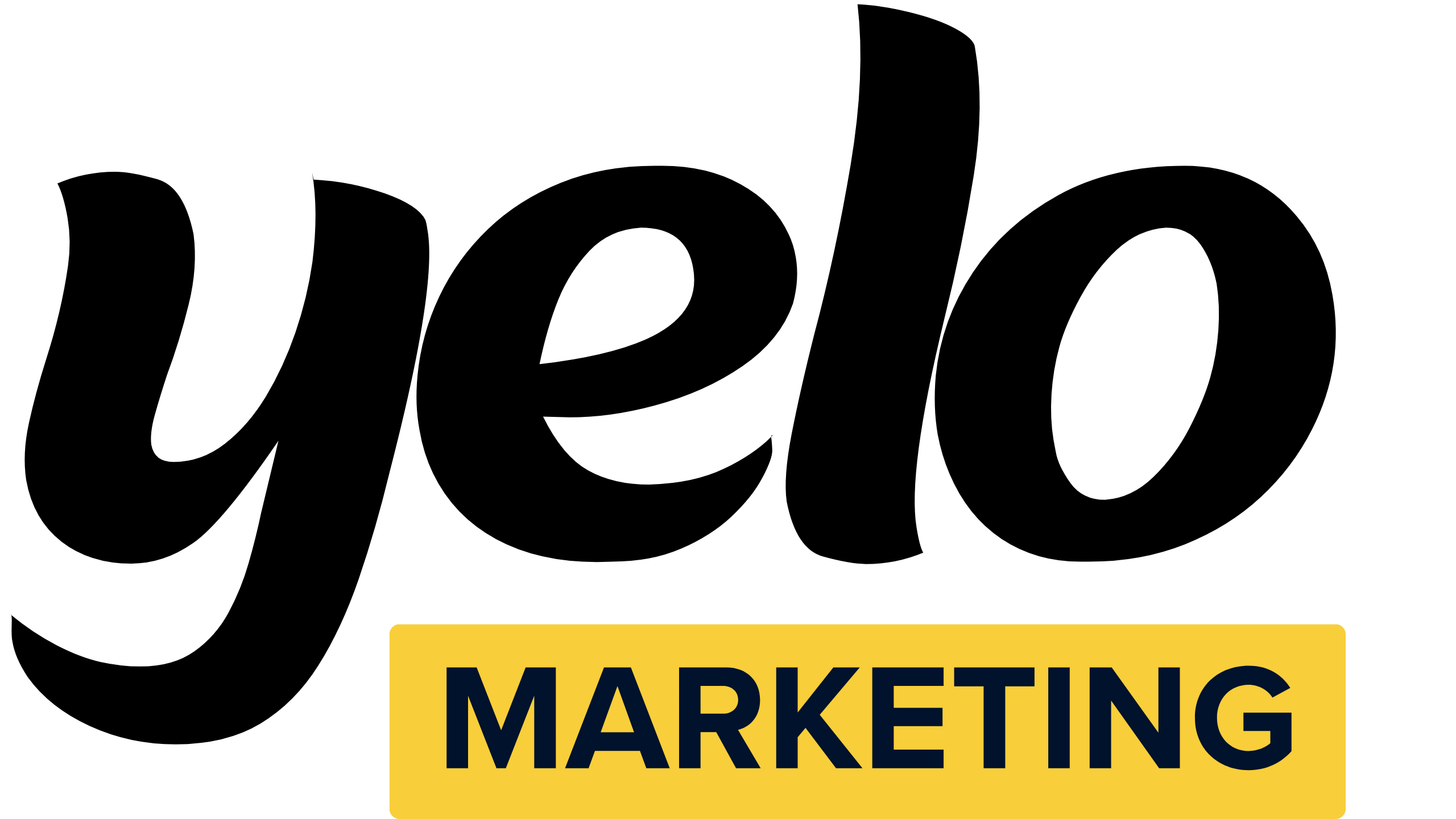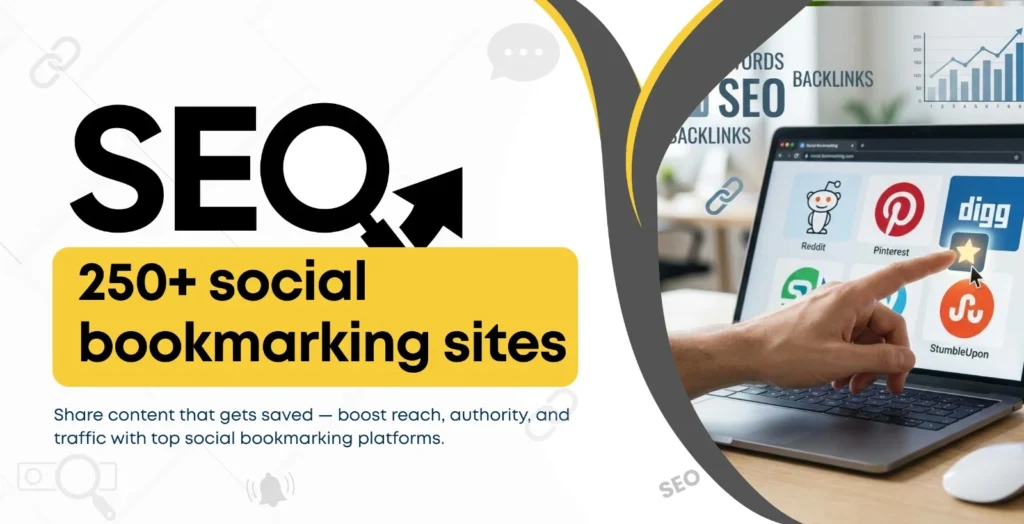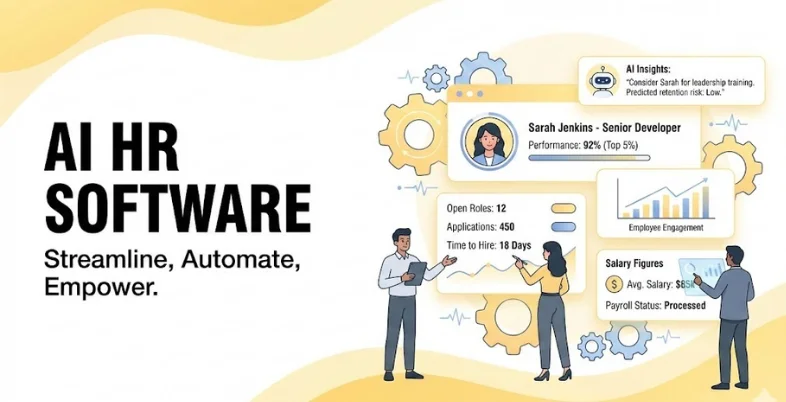Small businesses are exciting as well as challenging to operate. A business owner has many things on their plate because he/she has to respond to customer inquiries, track the sales, and make sure everything is running well each day. Amid these duties, one of the things that is sometimes neglected is creating and developing good customer relationships. However, such relations are what growth is all about. It is here that a CRM (Customer Relationship Management) system would be necessary.
A CRM enables small companies to manage their databases of customers, improve efficiency in communicating, and maintain consistency in the handling of customers. There are numerous products on the market today, so selecting the appropriate CRM may seem overwhelming. To assist, we have put together the top CRM Software for Small Business Owners in 2025, including those platforms that may be new but have the power to enable business owners to work smarter, connect better, and grow with confidence.
What is CRM Software?
CRM software, or Customer Relationship Management software, is a tool that helps businesses organize and manage customer interactions in one place. It stores contact details, tracks communication history, manages leads, and automates follow-ups to save time. For small business owners, CRM tools is especially valuable because it simplifies sales tracking, improves customer service, and ensures no opportunity is missed.
By analyzing customer data, it also provides insights into buying behavior and helps build stronger relationships. In short, CRM software enables small businesses to work smarter, boost sales, and deliver consistent, personalized customer experiences that support long-term growth.
List of Best CRM Software for Small Business Owners
1. HubSpot CRM
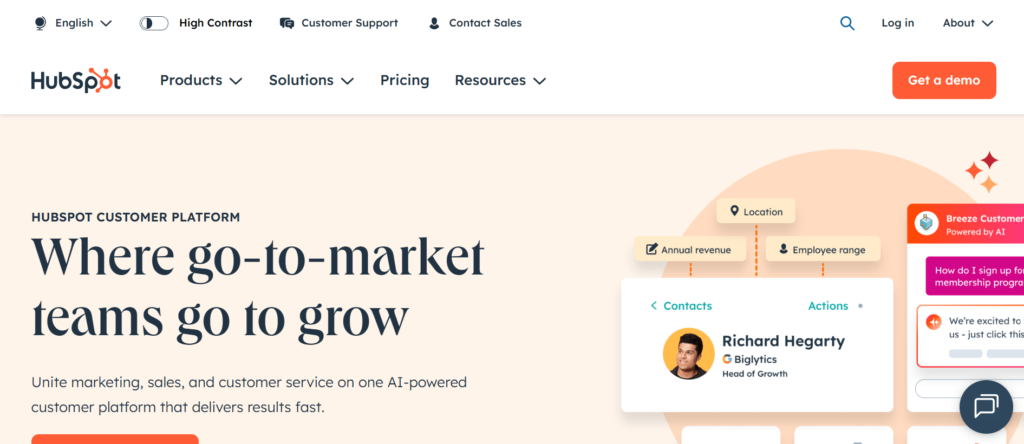
HubSpot CRM has now become a household name to many businesses that want to be more connected with their customers. To the small business owners, it is considered to be reliable due to its good image in the market.
HubSpot is the system that a lot of companies resort to when they specifically desire a trusted system that feels familiar and reliable. It offers a professional environment to arrange relationships within the team and still maintain relationships with the customer at the core of business development.
Features:
- Powerful automation for sales, marketing, and customer service.
- Visual sales pipeline and real-time tracking.
- Centralized client data and ticketing system.
- User-friendly with strong community support.
- Robust analytics and reporting.
- Scalable solution across multiple business areas.
- Free plan available.
Best for: Versatility, getting started free, and all-around use.
Price:
- Free plan
- paid starts at $20/user/month ($4,300/7 users/month for higher plans).
2. Zoho CRM
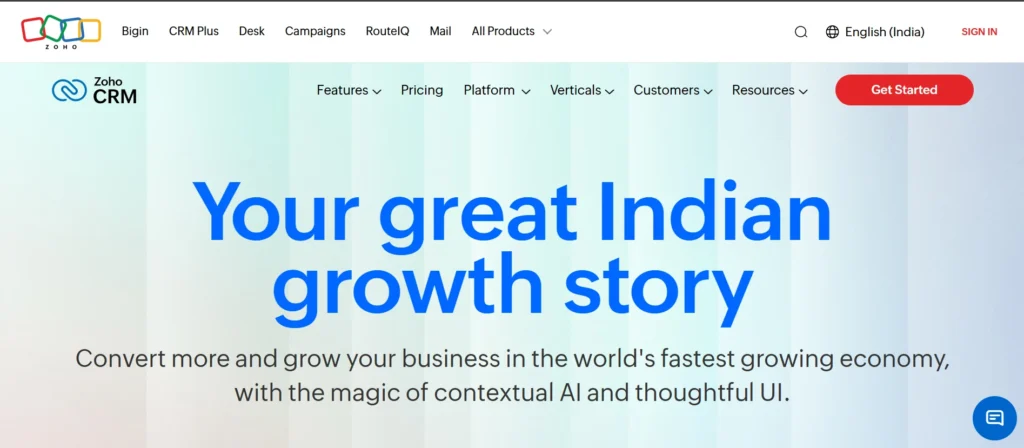
Zoho CRM can be the most sought-after platform by many other emerging businesses globally. It has also secured its position as a part of the larger Zoho ecosystem, which many business people are already familiar with and trust. Integrated with Zoho’s productivity tools such as Invoicing Software, it provides small businesses with a seamless way to manage sales and billing in one ecosystem.
Small businesses, especially, are more attracted to Zoho since it is personable but strong enough to foster business development. It has turned out to be a trusted associate to firms interested in enhancing their relations with their customers sustainably.”
Features:
- Zia AI for data analysis, predictive insights, and lead management.
- Rich reporting and analytics (200+ ready-made reports).
- Extensive customization: custom dashboards, fields, and modules.
- Marketing automation, Salesforce integration.
- Bulk email management and assignment automation.
- Flexible with many integrations.
Best for: Customization and AI features.
Price:
- Free plan
- paid plans from $20/user/month ($200/5 users/month for advanced features).
3. Salesforce
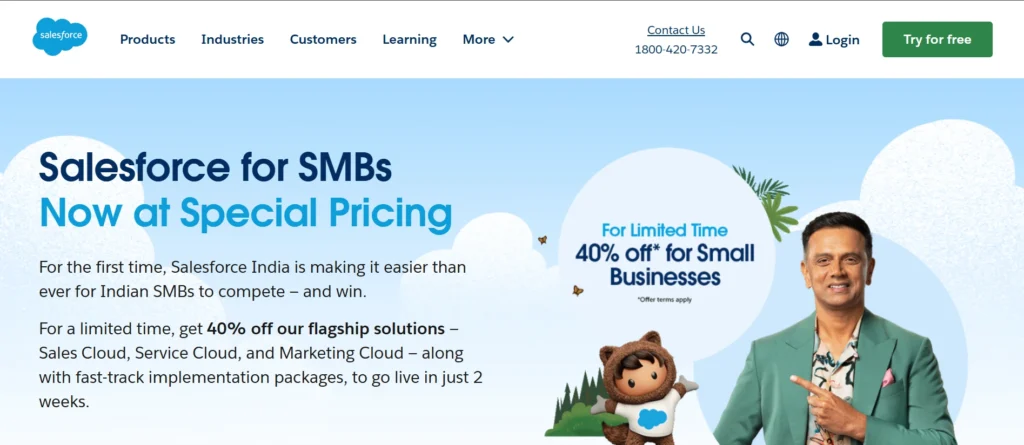
Salesforce is one of the most recognizable brands in the CRM sector, and its reputation spans across all quarters of business. In the case of small businesses, it gives them a feeling of sturdiness and legitimacy, an aspect that is essential when attempting to earn the trust of customers.
Salesforce is another company that is attracting the attention of many entrepreneurs, not only due to the fact that it has a global reputation, but mostly due to professionalism, order, and reliability in customer management over the long term. People identify it with developments and prosperity.
Features:
- Sales, Service, Marketing, and Commerce clouds.
- Real-time data and analytics, strong automation.
- Highly scalable platform.
- Data Cloud, Agentforce AI chatbots.
- Einstein AI for predictive analytics and automation.
- A wide range of add-ons/extensions is possible.
Best for: Extensibility, scalability, and advanced analytics.
Price:
- Starts at $25/user/month
- business plans $165/user/month.
4. Pipedrive
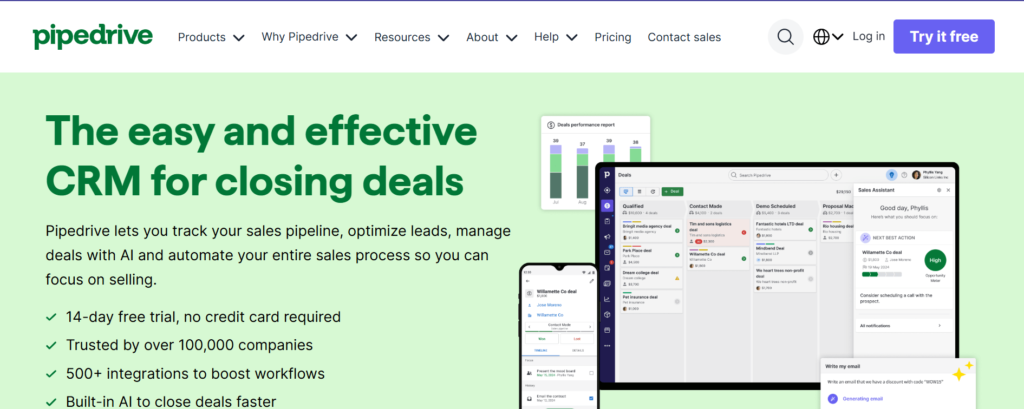
Pipedrive has also garnered an award as being an easy tool in such a way that handling customers does not seem to be too overwhelming. It particularly presents itself as an attractive option to small business owners since it does not attempt to overcomplicate things. It does not; instead, it assists teams to concentrate on organizational efforts and tracking of the customers in a seemingly natural manner.
Pipedrive has an established customer base within the context of small businesses that appreciate the importance of transparency and simplicity in the choice of solutions rather than complex systems.
Features:
- Visual, kanban-style sales pipeline.
- Activity tracking and smart reminders.
- Customizable workflows and a mobile app.
- Deal rotting cues help prioritize stagnant deals.
- Easy workflow automation, designed by salespeople.
Best for: Sales management, ease of use, and visual SME selling.
Price:
- Starts at $24/user/month or $395/5 users/month.
5. NetHunt CRM
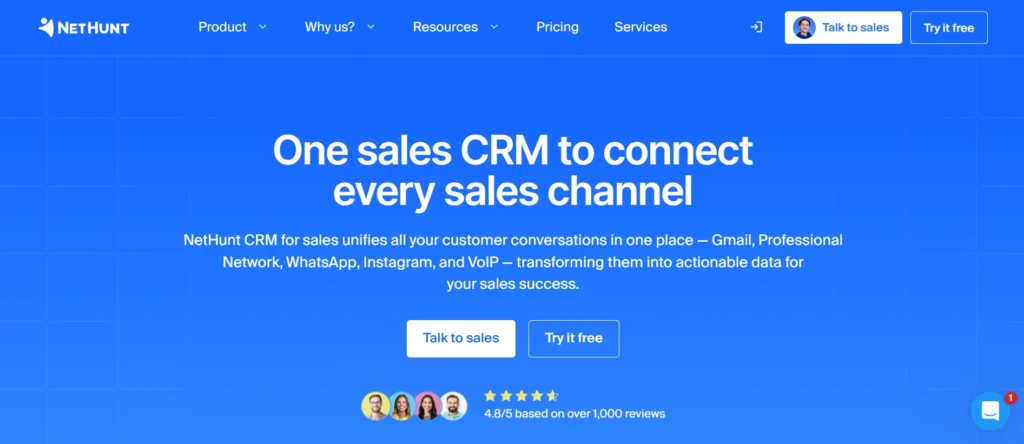
The outstanding feature of NetHunt CRM is its capacity to integrate into daily business processes. It is also a relief to many small business owners because they feel that the process to adopt CRM is easier since it fits in well with such tools they have been using.
NetHunt does not add any additional levels of complexity, but rather seems like an addition to an existing system of a company. This makes it a convenient and viable option for businesses that do not want to lose the flow of their team but would like to enhance their relationship with the customers.
Features:
- Gmail integration, email marketing, and automation.
- Marketing workflows and template builders.
- Custom dashboards for reporting.
- Sales pipeline visualization.
Best for: Simple automation, email-centric teams.
Price:
- $24/user/month.
6. Bigin by Zoho
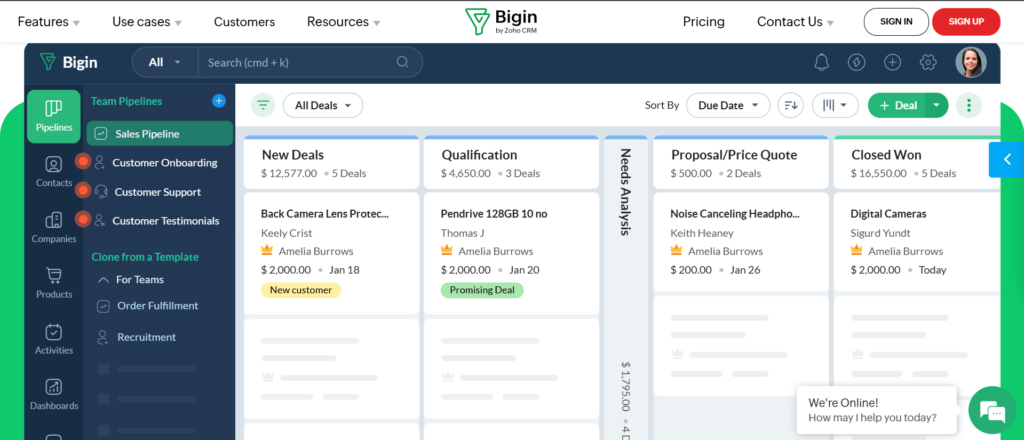
The Bigin is a product of Zoho designed to fit small businesses and startups by providing them with an easy on-ramp into customer relationship management. Smaller teams tend to be inclined to ignore complex CRMs, and that is where Bigin comes in to fill the gap. It is simple, easy, and formulated in such a way that it is less frightening to businesses in the initial stages of operation.
With time, Bigin has emerged as a nice stepping stone that business owners can approach when seeking to get organized without being bogged down by all those steps towards achieving that organization.
Features:
- Pipeline-centric approach for small teams.
- Simple setup and highly affordable.
- Customizable sales pipeline.
- Mobile app available.
Best for: Very small teams, simplicity.
Price:
- $7–12/user/month.
7. Freshsales
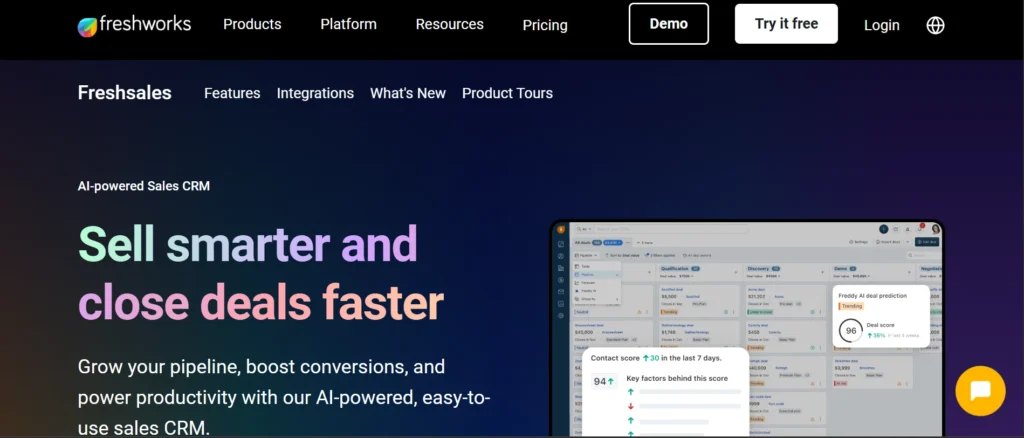
Freshsales is the recent addition to the family of Freshworks that has become popular among small and mid-sized companies rapidly. Its branding is also solid, yet more significant is the sense of approachability to the entrepreneurs not experienced with CRMs. Its capacity to allow things to remain well organized and at the same time simple to adopt is what has provided solace to many business owners.
Freshsales has presented to the company a solution that is relied upon as a solution to providing the business with a means of ensuring that it is consistent in customer relationship management, and yet can shift focus towards growth.
Features:
- Freddy AI for lead scoring and predictive sales.
- Visual pipeline management.
- Integrated communication (email, phone).
- Customizable workflows.
- Mobile app for sales tracking.
Best for: Teams needing AI-powered sales tools.
Price:
- ₹999/month
- $295/5 users/month.
8. CRMOne
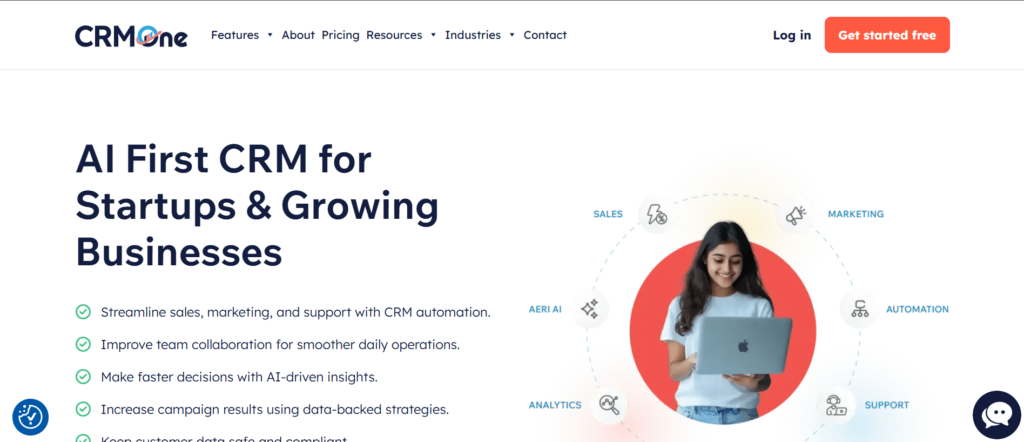
CRMOne will assist small companies to maintain their customer relationships lucid and manageable. CRMOne will be less cumbersome and technical as opposed to most systems, which often feel heavy, like they are too technical to be used. It appeals to corporations that like being simple on the one hand and being organized on the other.
When used as a contemporary option within the realm of CRM, CRMOne instills in developing companies the faith that they are erecting robust foundations of customers without redundant intricacy.
Features:
- AI-powered insights and a voice AI assistant.
- Automated lead management, workflow automation, and template builders.
- Personalized marketing across platforms (email, WhatsApp, social).
- Customized dashboards and legal/data protection adherence.
Best for: AI automation, all-in-one small business solution.
Price:
- $70/10 users/month (annual plan).
Suggested read: HR Management Software for Small Businesses
9. Centripe
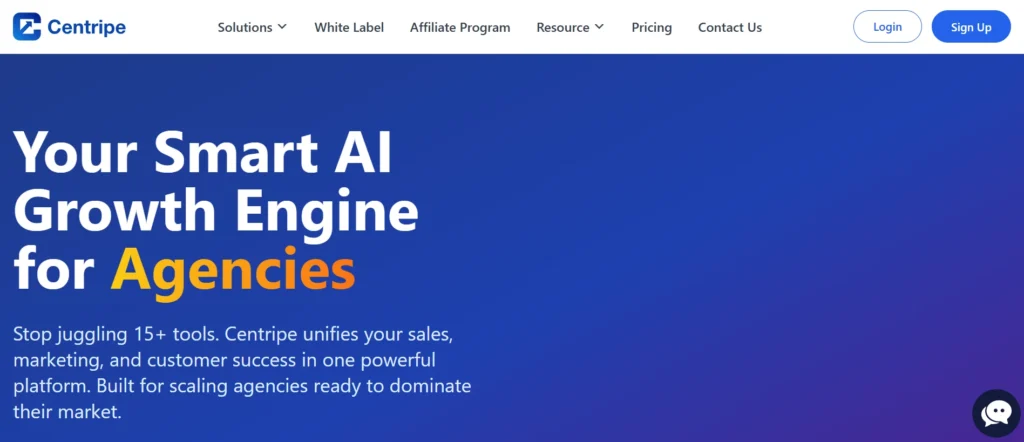
Centripe is a relatively novice company in the world of CRM, but it is drawing some traffic among small businesses. It is attractive because it has a simple decoration that is refreshing to teams that do not want to deal with complex systems.
When they need something simple, functional, and not overwhelming, small organizations go to Centripe. Despite its continuing establishment, Centripe is creating a niche as an adaptable and personable solution to businesses that value a fuss-free relationship with their customers.
Features:
- Free CRM with unlimited users.
- AI-driven workflow automation.
- Visual sales pipeline, customizable dashboards.
- Contact management and campaign management.
- Social media management and white-label options.
Best for: Large teams seeking affordability.
Price:
- $299/month (unlimited users).
10. Omnisend
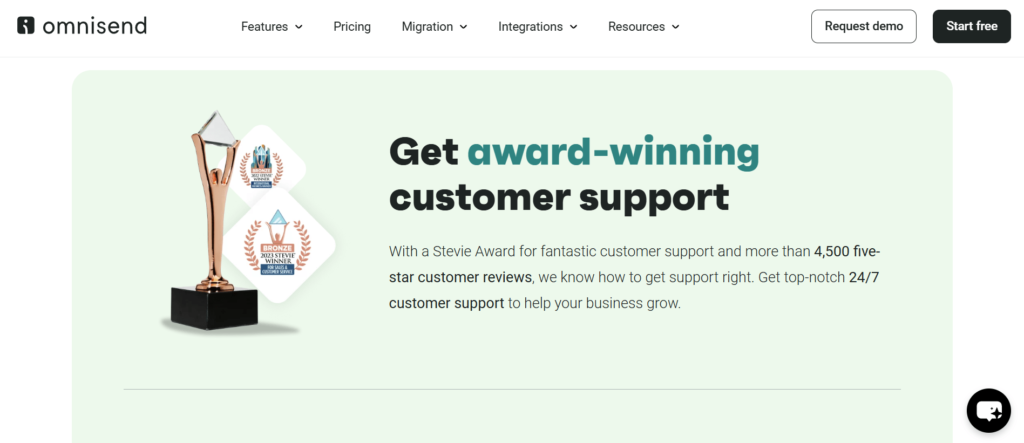
Omnisend is well known as a company that helps with marketing automation, and it carries that enthusiasm into the CRM of small companies. This is one of the reasons why many entrepreneurs appreciate the ability to have both communication and customer management in one location. This brings about the impression of uniformity in the way small companies deal with their clients.
Throughout the years, Omnisend has established a reputation for trustworthiness with various businesses that are interested in retaining contact and providing an uninterrupted customer experience.
Features:
- Omnichannel marketing, including SMS, email, and push notifications.
- Advanced automation workflows and customer segmentation.
- AI-powered recommendations.
- Unique discount codes for marketing campaigns.
- Integration with popular e-commerce platforms.
Best for: Omnichannel marketing, SMS-focused.
Price:
- $206.5/5 users/month.
11. Capsule CRM
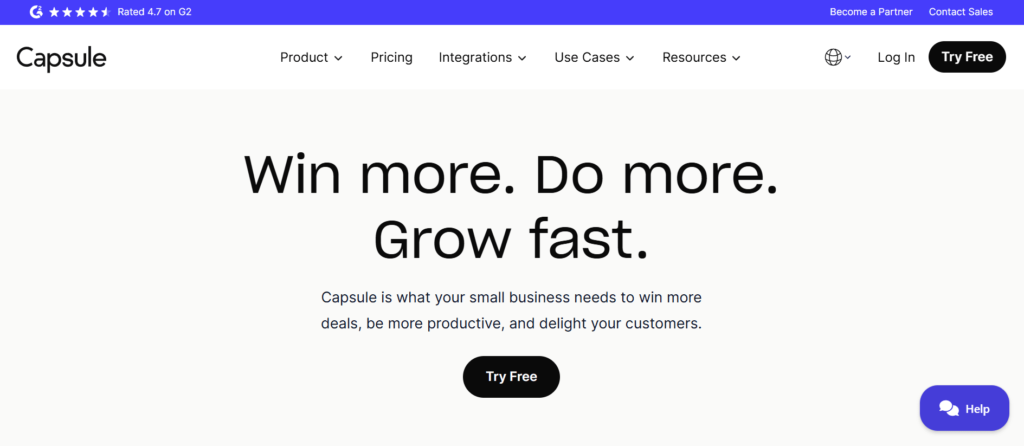
Capsule CRM has developed a reputation for being a clean, simple, and friendly solution for small businesses. Most business owners like the fact that it does not overwhelm them with a lot of complexity. It is particularly appealing to firms venturing into acquisitions of a CRM, because it offers them easy access.
Capsule has successfully tried to remain current by continuing to do what is most important to small businesses: to organize customer relationships in an efficient manner without turning it into an unnecessarily complex task.
Features:
- Task/project management with customizable pipelines.
- Google Workspace and Microsoft 365 integrations.
- Auto-enriched contact profiles with social data.
- Simple and intuitive UI.
- Sales forecasting and customer management.
Best for: Intuitive task/project management.
Price:
- $360/5 users/month.
12. Fuzen
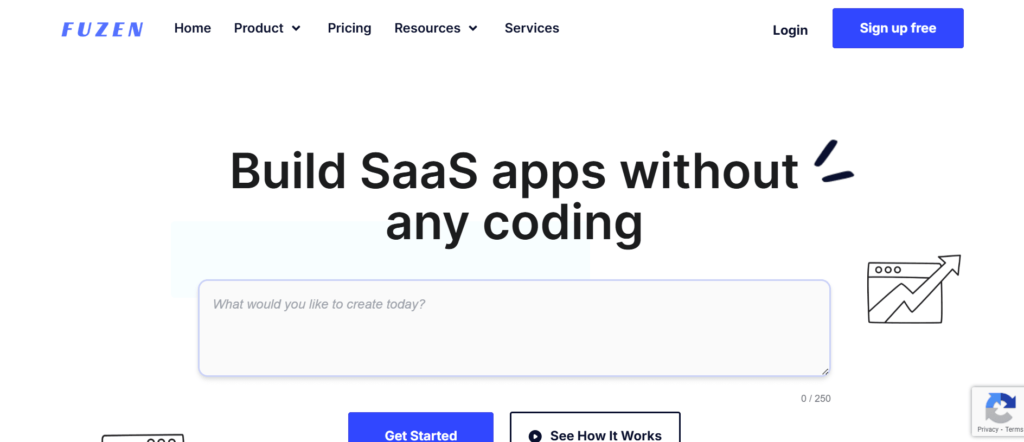
Fuzen is a new CRM to the market, built to the specifications of small businesses of today. It attracts teams that seek a system they can feel lightweight and yet reliable. It is common to find features of Fuzen being adopted by entrepreneurs since they can bring structure without complexities.
Though Fuzen remains on the rise, it already has its niche among the businesses that prefer to keep their operations simple. It is a novel trend of flexible CRM tools that makes greater customer-oriented growth.
Features:
- No-code custom CRM software.
- AI-powered processes and workflows.
- One-time payment for lifetime use.
- Especially relevant for Indian small businesses.
- Highly affordable, limited support/features.
Best for: Ultra-affordable, customizable CRM for India.
Price:
- One-time fee.
13. Microsoft Dynamics 365
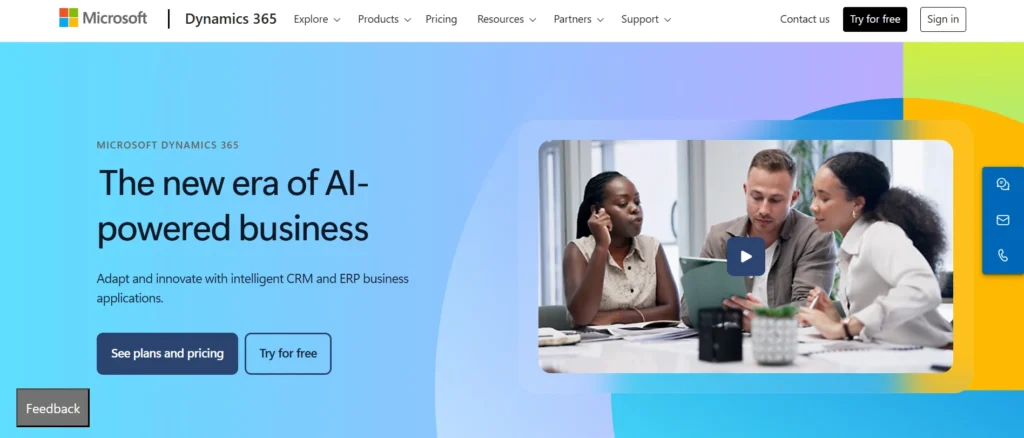
Microsoft Dynamics 365 is a flexible and robust CRM Software that intertwines flexibility with the power of the Microsoft ecosystem. This is to provide more customization and a more integrated platform to businesses that want more business customization and provide efficiency of execution to customers across departments.
It is unified and gives a connected environment when it comes to sales to service, and it is able to facilitate long-term development. It is flexible enough to make it a good option for those companies seeking sophisticated digital transformation.
Features:
- AI-powered workflows and predictive analytics.
- Deep integration with the Microsoft ecosystem.
- Customizable modules for industries like finance and retail.
- Unified customer data across sales, service, and marketing.
- Built-in IoT and mixed reality capabilities for advanced business use cases.
Best for: Mid-size to large enterprises needing extensive customization and Microsoft integration.
Price:
- Starts at ~$65/user/month.
14. SugarCRM
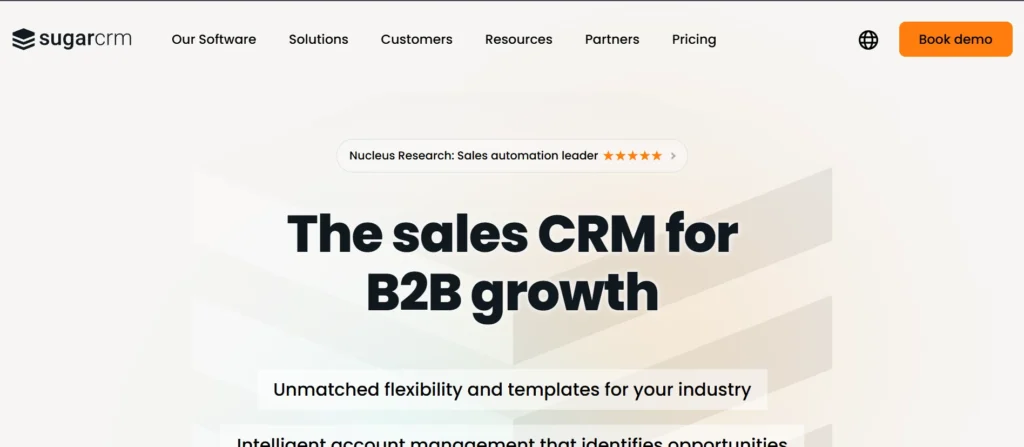
SugarCRM is constructed to suit the needs of businesses that favor control and tailoring when it comes to the management of customer relationships. It is directed at providing organizations with the possibility to customize workflows to their particular requirements, yet maintain operations optimally.
The platform is nimble and allows it to scale alongside your business, even as it keeps teams in sync. SugarCRM holds particular appeal with businesses with more than mere CRM functionality in mind who require a solution that can be tailored to their business processes. Its advantage is that it is long-term flexible, hence, a reliable agent of changing demands.
Features:
- Highly customizable workflows and AI automation.
- Multi-channel communication management.
- Lead routing and quote management.
- Robust analytics and customer journey mapping.
- Open API for easy integration with third-party apps.
Best for: Businesses requiring tailored CRM with strong automation.
Price:
- Starts at ~$10/user/month.
15. Insightly
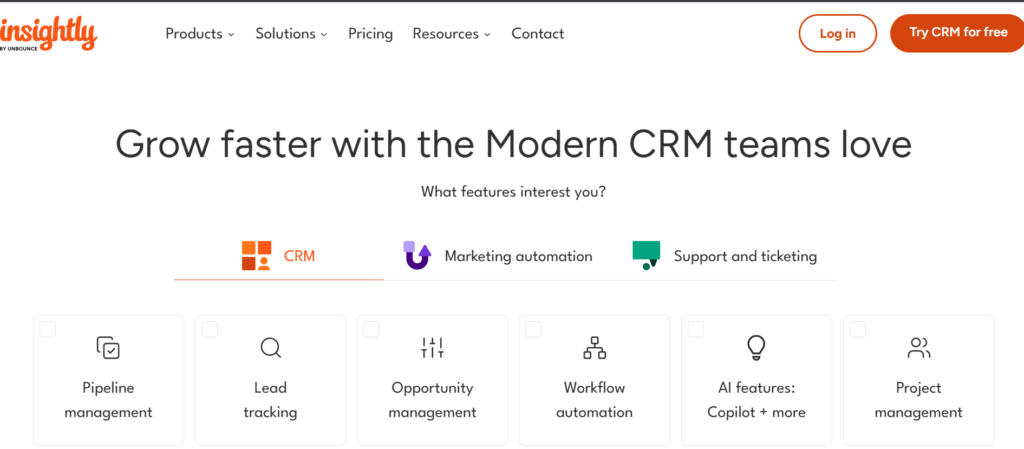
Insightly is a CRM Software that is made to ease the process in which service-based businesses operate both sales and project management. It offers a centralised area to control the relationships with clients, as well as keeping projects in order and focused. This the reasons why it is an attractive option to businesses that not only sell, but additionally provide continued services.
Insightly gives companies an opportunity to remain trustworthy to customers and, at the same time, achieve a smooth run of projects. It also blends the distances between sales and delivery, hence very useful to the service industries.
Features:
- Opportunity and project management integration.
- Workflow automation and AI-driven reporting.
- Email tracking and mobile CRM.
- Contact relationship linking and in-depth sales forecasting.
- Customizable dashboards and web-to-lead forms.
Best for: Services businesses needing CRM plus project management.
Price:
- Starts at $29/user/month (Plus).
Comparing CRM Software Listed Above
| CRM Name | Best For | Notable Features | Pros | Cons | Starting Price |
|---|---|---|---|---|---|
| HubSpot CRM | Versatility, Free plan, Automation | Sales pipeline, Marketing automation, Analytics, Ticketing system | Free plan, User-friendly, Scalable | Advanced features locked in higher tiers | Free; Paid from $20/user/mo |
| Zoho CRM | Customization, AI features | Zia AI, 200+ reports, Custom dashboards, Marketing automation, Integrations | Affordable, Flexible, Powerful automation | Steep learning curve | Free; Paid from $20/user/mo |
| Salesforce | Scalability, Advanced analytics | Sales/Service/Marketing Cloud, Einstein AI, Data Cloud, Agentforce chatbots | Highly scalable, Rich automation, Global use | Expensive, Complex setup | From $25/user/mo |
| Pipedrive | Ease of use, Sales-focused SMEs | Visual sales pipeline, Deal rotting cues, Workflow automation, Mobile app | Simple, Intuitive, Designed by salespeople | Limited advanced features | From $24/user/mo |
| NetHunt CRM | Email-driven teams, Gmail integration | Gmail integration, Email marketing, Workflow automation, Sales pipeline | Easy adoption, Email automation focus | Limited add-ons/extensions | $24/user/mo |
| Bigin (Zoho) | Simplicity, Very small teams | Pipeline-centric, Mobile app, Affordable | Easy setup, Low cost | Feature-limited vs Zoho CRM | $7–12/user/mo |
| Freshsales | AI-powered small teams | Freddy AI, Visual pipeline, Integrated comms (email/phone), Custom workflows | Good AI tools, Affordable | Free plan limited | ₹999/mo (~$12/user/mo) |
| CRMOne | AI automation, All-in-one SMB solution | Voice AI, Lead automation, Workflow builder, Personalized marketing | Cost-effective, AI-powered | Newer tool, Learning curve | $70/10 users/mo (annual) |
| Centripe | Large/small teams, Budget-friendly CRM | Free CRM, Unlimited users, AI automation, Social media mgmt., White-label options | Unlimited users, Affordable | Limited integrations, Support constraints | $299/mo (unlimited users) |
| Omnisend | Omnichannel marketing (SMS/email focus) | SMS, Email, Push, AI recommendations, Discount codes, E-commerce integrations | Strong SMS/email automation, Segmentation | Higher pricing | $206.5/5 users/mo |
| Capsule CRM | Service firms, Task & project management | Google/MS integrations, Sales forecasting, Task mgmt., Custom pipelines | Simple UI, Intuitive, Lightweight | Basic reporting, Limited templates | $360/5 users/mo (~$18/user) |
| Fuzen | Indian SMBs, No-code customization | AI workflows, No-code CRM, Lifetime one-time fee | Ultra-affordable, Customizable | Limited support/features | One-time fee |
| Microsoft Dynamics 365 | Enterprises, Microsoft ecosystem | AI insights, LinkedIn integration, IoT, Mixed reality, Custom modules | Highly customizable, Robust ecosystem | Expensive, Complex licensing | From ~$65/user/mo |
| SugarCRM | Businesses needing customization & control | Custom workflows, AI, Lead routing, Analytics, Multi-channel communication | Highly flexible, Scalable, Strong automation | Can be complex to implement | From ~$10/user/mo |
| Insightly | Service-based businesses (CRM + Projects) | Project + CRM integration, Workflow automation, Email tracking, Sales forecasting | Combines projects + sales, Easy email tools | UI less intuitive, Limited customization | From $29/user/mo |
How to Choose The Best CRM Software for Small Business?
You must remember the following when choosing a CRM to use in your small business:
- Write down what you want achieved– Find out what you want the CRM software to do. Such as is it to organize customer information, monitor sales, or client correspondence? Having the knowledge of what you want to do will help you not purchase a tool that has features you might never utilize.
- Seek convenience to use – A CRM must not be intimidating. Small businesses may not have many members of staff, and thus the system should be straightforward such that everyone can be able to learn rapidly and utilize it daily without getting irritated.
- Test scalability- what you may need now is basic, but in the future, you will need more. To change later would be a bad idea, so make sure that your CRM can increase users, customers, and functions as you grow in the future.
- Take integrations into account – Good CRM tool must be able to integrate with other platforms that you currently use, e.g., email platforms or accounting software, or marketing. This eases your process and saves time.
- Consider support and training-Even the most instinctive CRM can require some training. Seek providers who provide tutorials, customer support, or training material so that your team can maximise it.
Things to Avoid Doing When Deciding on a CRM Software
There are some universal errors made by small businesses in the process of selecting a CRM. It is a waste of time, money, and frustration to avoid them:
- Counting complexity instead of simplicity -Not every CRM has only a few sophisticated functions; there are CRMs with infinite numbers and features that a small business might never use. A complex system usually requires teams to use it all, hence the investment becomes useless.
- Forgetting scalability– A CRM that serves you now may not serve you tomorrow as your customer base expands! When it fails to scale, you will end up having problems with migration later on, and that is expensive and time-consuming.
- Not training your staff- Your staff may be using an excellent CRM uselessly without training. Small businesses attach little importance to training, and most of them fail to take up the training, yet resources end up going to waste.
- Price concentration only – As much as price is of concern, it does not mean that the cheapest is necessarily good. Some low-cost CRM may fail on reliability, support, or necessary functionality, which is more expensive in terms of cost.
- Failure to define business needs– Making the plunge into a CRM without really knowing your needs tends to give a wrong match. Take some time to make lists of your priorities for a system before committing.
Conclusion
Finding the best CRM Software for Small Business Owners isn’t about picking the most popular tool—it’s about choosing one that truly fits your workflow, customer needs, and growth plans. Given the abundance of tools, it is best to figure out what tools best fit your needs based on your objectives, the size of your organization, and where you want to be in the future.
Depending on your desired ease of use and flexibility, there is a CRM that will suit your requirements. What we s need to remember is that using the correct CRM software not solely a piece of software that you use and abandon; it is a long-term companion that will enable you to keep in touch with your customers, make better decisions, as well as build a gateway to sustainable growth.
FAQs
1. What is a CRM software, and why do I need it as a small business?
A CRM is an application that is used to manage customer data, customer interaction, and to make a stronger connection between the business. It is required by small businesses to conserve time, enhance communication, and be familiar with customer behavior.
2. What does it take to select the best CRM software for a small business?
To make the best choice, it is better to add up your business goals, make sure your CRM is easy to use, find out whether it supports your present applications, and check whether it can match the scale of your business.
3. Which CRM is the simplest to use?
CRM such as Bigin by Zoho, Pipedrive, or Capsule are easy to use. They are simple to use with easy navigation and straightforward set up and thus they are one of the best for fledgling small teams.
4. Do CRMs have any real potential in raising sales?
Yes, CRMs result in increased sales in that they enable you to control leads, remind you of follow-ups, and highlight where opportunities are in your sales pipeline. They also give insightful reports that bring out winning strategies.
5. Do CRMs apply only to big companies?
No, there is widespread use of CRMs by small businesses as well. Contemporary CRMs are lean, low-end, and adaptable, enabling small firms to handle customers proficiently without having to possess large resources.
